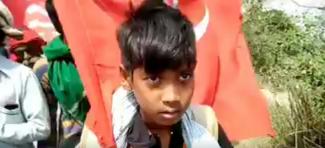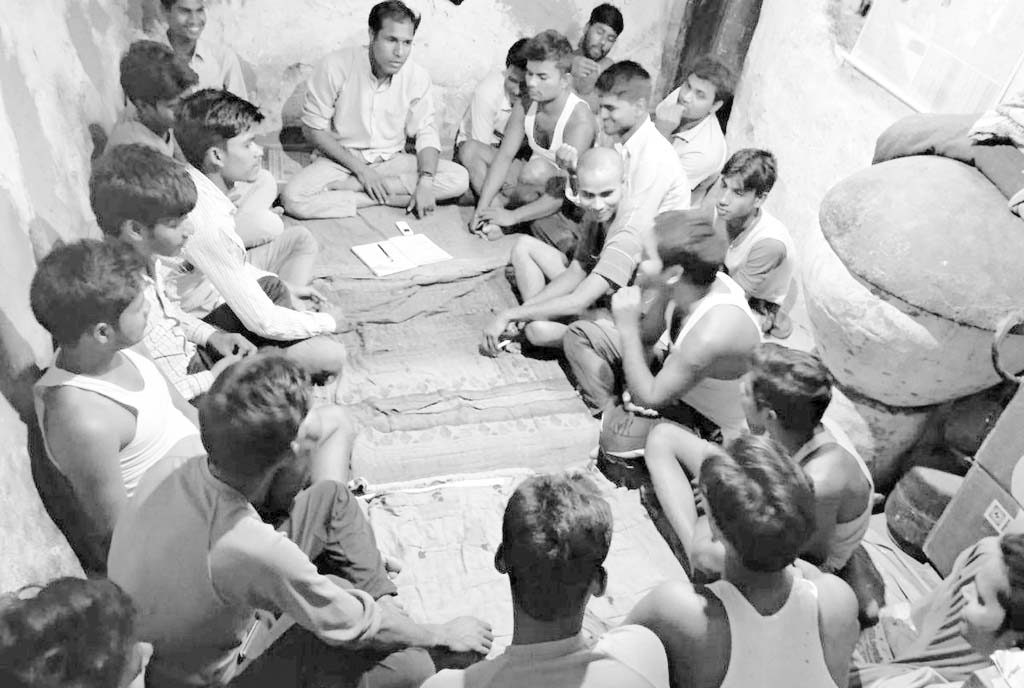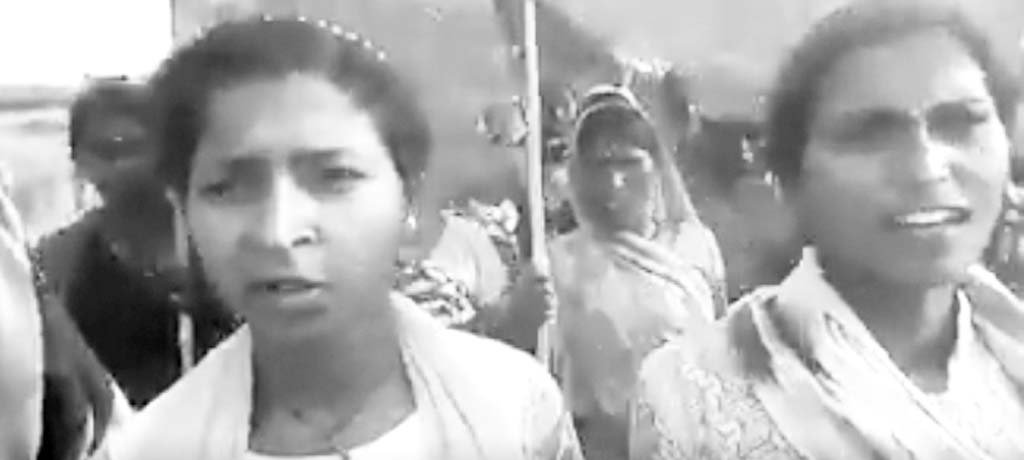
Cultural activists participated in large numbers in the CPI (ML) Janadhikar Padyatra and Mahasammelan on 1 May 2018 at Patna, giving a new energy and impetus to the events. The central slogan for this campaign was ‘Evict BJP-Save Democracy, Save the Country’.
Generally, writers and cultural activists do not stand with such a direct slogan. But after the coming to power of the BJP at the Centre and in several States, the way in which communal-casteist brutality has increased, attacks on debate, logic and democracy have escalated, intellectuals like Dhabolkar, Pansare, Kalburgi and Gauri Lankesh have been murdered, has shaken the soul of every sensitive person. Writers and cultural activists, who dream of a world free from oppression, repression and inequality, are very disturbed in these dark times. They are eagerly searching for people who would help turn their dream into reality. But they also know that maintaining the status quo while waiting for a revolutionary group of people or merely taking selfies with such people will not change the situation on the ground. That is the reason Jan Sanskriti Manch National Councillor and people’s poet Krishna Kumar Nirmohi joined the Janadhikar Padyatra in Bhojpur and Patna Districts and challenged the fascist aspirations of the BJP government with his folk songs and reached Patna with the Padyatris.

Hirawal cultural activist Priti Prabha also covered a distance of about 80 km with the Padyatris and raised their enthusiasm and energy with people’s songs throughout the journey. Ravi Ranjan from JASAM, Jehanabad, and Kamta Yadav from the Pukar team from Aurangabad travelled in the Magadh region with the Gaya padyatris. Jitendra and Ramadhin Chohan, comrades from a singers’ group in Hilsa were also with the padyatris. Anil Maharaj and many other people’s poets and singers were also boosted the enthusiasm of the padyatris with their songs.
People’s political campaigns and movements such as the Janadhikar Yatra and Mahasammelan also provide a fresh impetus to cultural creativity, witness the group songs so beautifully sung by farmers and women who participated in the Padyatras. We saw just such an example at Hilsa and Bhojpur where women participants in the Padyatra sang group songs collectively. The songs not only had voices, but also accompaniments, those these were out of the ordinary. Plates, glasses, and bowls were played upon as though they were drums and ‘mridangs’. They sang: “Dhanwa se bharal ba godamva, beta hamar bhookhe sutalba na” (The godown is bursting with grains, but my child is sleeping hungry). Women from Bikramganj sang, “We don’t even have huts/If we demand homes they say we’re destroying the social order/The sahebs have unleashed enough injustice/Sister, we won’t bear this injustice anymore!”
Resting in some small garden during the day or sleepy at night after a hard day, the people still sang songs and gave the Janadhikar Yatra the added shape of a cultural Yatra. Songs were not only being sung along the way, new songs were also being created and tried out.
Hirawal artist Santosh Jha, Santosh Sahar and Parvez took up the responsibility of posting and communicating news related to the entire campaign through alternative media. They made several news bulletins and posted them on social media.
Thus the cultural activists directly joined the Janadhikar Padyatra and took up the reins of communication. While the Padyatris were passing through Bailey Road in Patna JASAM Patna Convener Rajesh Kamal and poet Shashank Mukut Shekhar took charge of the responsibility of providing them with Sattu-and-water drinks. Shashank Mukut Shekhar took memorable pictures and videos on his camera which were shared on social media. The time for the Mahasammelan was 12 noon on 1 May but the cultural session of the Mahasammelan started from 10 AM itself, conducted by JAAM State Secretary Sudhir Suman, and lasted for 2 hours. During this session Anil Kumar from Kaimur declared, “Nahi jaan denge, na ehsaan lenge/Hum ladke apna samman lenge” (We shall neither give up our lives nor take any favours/ we shall fight and wrest our due rights).
Kamlesh Kumar from Naubatpur put his finger on the pulse of the cause of the struggle when he said—we want to remove this mountain of injustices. Dhanraj Krantikari from Patna District smudged the boundaries between song and speech when he fired questions at the Prime Minister and demanded answers.


Ravi Ranjan from Jehanabad told the people about the aim of the Janadhikar campaign in Bhojpuri—Hark, the people from villages and cities have mobilized and gathered to herald the eviction of the BJP.
Kamta Yadav from the Pukar team targeted Nitish Kumar and said the people have seen the reality; the fig leaf is off and no illusions are left.
Priti Prabha, Rashida Khatun and Chintu Kumari sang the well-loved song created by the Bhojpur movement people’s poet Vijendra Anil, ‘Badli Ja Deshwa ke khakha, Balamleke lalka Pataka ho’.
Nanku Paswan from Beguserai sang the song created by famous people’s poet and freedom fighter Ramakant Dwivedi Ramta, ‘Roti ki Mahima’. Poet Ram Shreshtha Diwana described the current situation in the country and asked searing questions:
How long will you remain hungry, brother?
Time has come to march towards Delhi;
This is the reign of scams
And bandits wear the crown;
The most dishonest of them all Grabs the highest chair;
Such utter darkness envelops the country
Where humanity dies at every moment
And the Emperor is the biggest butcher.
How long will you remain hungry, brother?
He also commented on the current socio-political situation through his poem ‘Phansi par Ganatantra’. Krishna Kumar Nirmohi presented his song, ‘Unmadi Utpatiyan ke Badhal Atyachar/JabDesva mein Aayil Fasivadi Sarkar’.
He, along with people’s poet from Kaimur Singasan Ram, declared the people’s resolve to fight and carry forward the struggle, through the song in Bhojpuri which says that the ’19 election will be a fight to the finish where the people will unite to throw out this evil government and nullify their poisonous communal hate campaigns; and farmers, workers, students and youth will fight together for land reforms, labour reforms, education, and employment.
The songs continued as the Padyatris poured into the Gandhi Maidan for the Mahasammelan. When General Secretary Com Dipankar Bhattacharya and other leaders arrived with the Padyatra group from Shahbad welcoming slogans of ‘Lal Salam’ reverberated in the air. The Mahasammelan was about to begin when the rain began in sharp lashings. The activists on the dais raised their slogans with redoubled vigour in order to prevent confusion due to the rain. It was a veritable war between the rain and the slogans! The pandals put up for the Mahasammelan were rendered ineffective by the heavy rain. It was as if Nature were throwing a challenge: you have borne the scorching heat and walked all these miles to Patna; now let us see how you make a success of your Mahasammelan in this rain! But the Padyatris had not come to the Mahasammelan with some small or petty resolve. They had come with the great resolve of ‘Evict BJP, Save Bihar, Save Democracy, Save the Country’! The rain drenched everyone, the leaders, the Padyatris, the activists. All at once the tactics from the dais changed and we decided to make the weather also our comrade.
Santosh Jha bent towards and Rajan Kumar and said something, after which Rajan’s powerful voice sang out, ‘Rimjhim Barse re Badariya, Mor Chadariya Bheegi Jaaye’ (Raindrops are falling and drench my clothes and my being). The slogans changed to songs and many voices joined in the refrain. People inverted the chairs they were sitting on and used them as umbrellas. The rain continued and the second song was begun, ‘Janta ke Aave Paltaniya Hilele Jhakjhor Duniya’. Now there was no sense of panic; everyone stood disciplined and organized. Finally the rain conceded defeat and retreated.
The Mahasammelan was formally opened with Hirawal artists first singing ‘Lakhon shaheedon ke khoon se ranga nisaan’ in memory of all the martyrs, and then Faiz’s ‘Hum Mehnatkash Jagwalon se Apna Hissa Maangenge’. Faiz’s May Day marching song resounded in every heart:
When we, the workers of the world, demand our fair share,
No patch of land, no mere country, we’ll demand everything that’s there!
For blood that was spilt, for gardens laid bare,
For every song that was killed in our hearts,
For every drop, every flowering bud, for every song we’ll seek redress.
When the world is set right, When all strife has been ended,
What we grow with our toil
We’ll share with everyone!
Liberation Archive
- 2001-2010
-
2011-2020
- 2011
- 2012
- 2013
- 2014
- 2015
- 2016
- 2017
-
2018
- January-2018
- February-2018
- March-2018
- May 2018
-
June-2018
- Karnataka Elections And After: India Must Get Ready To Deliver A Decisive Blow To BJP
- Four Years Of Modi Raj
- Killing Fields of Kashmir
- Thoothukudi Massacre: EPS And Modi Have Blood On Their Hands!
- TMC Terror in West Bengal Panchayat Polls
- The Jinnah Portrait is only a Pretext, Democratic India Is the Real Target!
- JANADHIKAR PADYATRA : Rural India Marches For Its Rights
- Jan Adhikar Padyatra in Jharkhand - 'Evict BJP, Save Jharkhand'
- Marx Bicentenary Celebrated Across the Country
- Monday Massacre: Tens of Thousands Stand in Solidarity With Palestinians
- Rural India Demands Employment: A Campaign in TN by AIARLA, AIKM
- Comrade Gangadhar Yadav
- Comrade Janak Manjhi & Comrade Sajjad Ansari
- Comrade Satyabadi Behera
- Comrade Vaskar Nandi
- Dr. Ashok Mitra
- Historic Unification of Nepal Communist Parties to Form Nepal Communist Party
- Palestine After the May 14 Massacre
- Raindrops Drench Our Being - Music Of The Marchers
- Let the Fifth Year of the Modi Government Be the Final Year of the Calamity
- More Power to The Iraqi Communist Movement
- Maduro Wins Venezuela Elections
- July 2018
- August 2018
- September 2018
- October 2018
- November 2018
- December 2018
- 2019
- 2020
- 2021-2030
Charu Bhawan, U-90, Shakarpur, Delhi 110092
Phone: +91-11-42785864 | Fax:+91-11-42785864 | +91 9717274961
E-mail: info@cpiml.org







